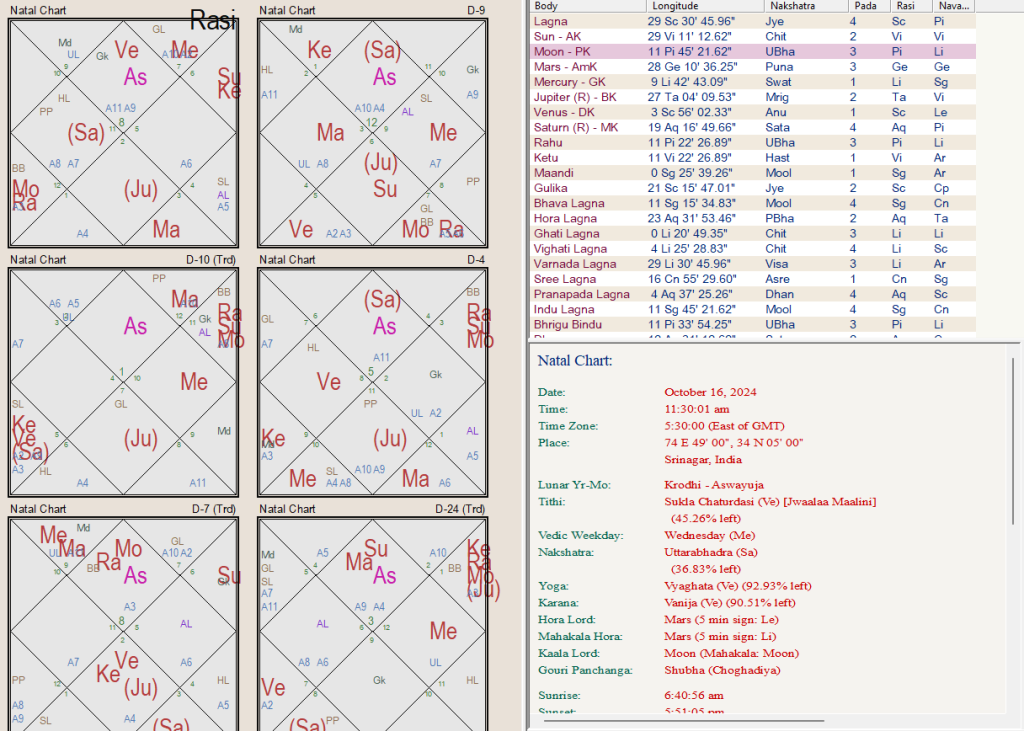
Astrological Analysis of the Oath-Taking Chart of J&K Chief Minister Omar Abdullah (October 16, 2024, 11:30 AM, Srinagar)
The astrological chart for Omar Abdullah’s oath-taking offers important insights into the challenges and opportunities he may face during his tenure as Chief Minister. Let’s analyze the key planetary placements and their implications for the government’s stability and leadership.
Lagna (Ascendant): Scorpio (Vrishchik Lagna)
Scorpio Lagna, ruled by Mars, signifies a strong, resilient, and determined leadership style. Scorpio is associated with transformation, strategic thinking, and handling challenges directly. However, it also suggests hidden power struggles, emotional intensity, and crises.
Planetary Positions and Analysis:
- Mars (Lagna Lord) in the Eighth House (Gemini)
Mars, the Lagna lord, is placed in the eighth house of transformation, sudden events, and secrets. This position often indicates a leadership fraught with unexpected challenges, crises, and hidden opposition. Mars in the eighth house signifies confrontation and power struggles, which could emerge from both within the government and from external forces.
The eighth house also represents obstacles and disputes, suggesting that Omar Abdullah may face covert opposition and potential conspiracies. His government could face instability, and its survival may depend on how effectively it navigates these hidden threats. Given Mars’s association with the sixth house (conflicts), there is a high possibility of confrontations with the central government, particularly over contentious issues like full statehood and Article 370, despite knowing that restoring it is nearly impossible. - Sun in the Eleventh House (Virgo)
The Sun in Virgo in the eleventh house represents leadership supported by alliances, networks, and long-term gains. This is a favorable position for achieving goals through practical, methodical planning and cooperation. Virgo’s influence on the Sun suggests that Abdullah’s leadership will be marked by careful decision-making and a focus on service and health-related issues.
However, the Sun’s placement here, while favorable for forming alliances, may also restrict his ability to act independently. His success will depend largely on external alliances and how well he can manage relationships with various political stakeholders. - Moon in the Fifth House (Pisces)
The Moon in Pisces in the fifth house enhances creativity, emotional intelligence, and public support. This placement suggests that Omar Abdullah will be able to connect emotionally with the public and make intuitive decisions, which will help in gaining popular support.
However, the Moon’s affliction by Rahu-Ketu (nodes of the Moon) indicates fluctuating fortunes. While it is the lord of the ninth house (fortune and destiny), its placement in the fifth house under the influence of Rahu-Ketu suggests periods of instability in leadership decisions. Emotional issues may affect governance, leading to inconsistent support from the public and allies. - Jupiter in the Seventh House (Taurus)
Jupiter in Taurus in the seventh house is a highly auspicious placement for diplomacy, alliances, and partnerships. It suggests that Abdullah’s leadership will benefit from strong partnerships and political alliances.
However, since Jupiter is retrograde, the strength of these alliances may fluctuate, leading to periods of irritation or conflicts with partners. The refusal of the Congress to participate in the government despite being offered a ministerial position is an early indication of these potential frictions. Abdullah may need to rely on independents and other political players, who could demand significant concessions in return for their support. - Saturn in the Fourth House (Aquarius)
Saturn in its own sign Aquarius in the fourth house provides stability in domestic matters, but its retrograde motion suggests delays and obstacles in governance, especially concerning public welfare, housing, and grassroots-level issues.
Saturn’s retrograde status indicates that Abdullah’s government may face challenges in stabilizing governance structures and implementing policies effectively. It also suggests poor stability of the government, with the possibility of recurring delays and hurdles.
Key Insights:
- Scorpio Lagna with Mars in the Eighth House: Abdullah’s leadership will face significant challenges, including power struggles, hidden opposition, and potential conspiracies. The Mars placement indicates a combative tenure with frequent crises.
- Sun in Virgo in the Eleventh House: Success will come through alliances and methodical, practical leadership. However, reliance on alliances may also restrict his freedom of action.
- Moon in the Fifth House: While Abdullah will connect well with the public, fluctuating emotional and political support may create instability in decision-making.
- Jupiter in the Seventh House: Strong partnerships and diplomatic relations will be key to his success, though retrograde Jupiter suggests periodic difficulties in maintaining these alliances.
- Saturn in the Fourth House: Retrograde Saturn points to obstacles in domestic governance and delays in public welfare initiatives, reducing the government’s overall stability.
Conclusion:
Omar Abdullah’s leadership, as indicated by the oath-taking chart, will be marked by resilience and strategic maneuvering, but it will not be without its challenges. The placement of Mars in the eighth house points to hidden opposition and power struggles, with potential crises along the way. His government may face internal issues, especially with allies like Congress refusing to join the cabinet, and independents demanding significant concessions.
The Sun’s favorable position in the eleventh house indicates gains through alliances and pragmatic decisions, but reliance on external support may limit independent actions. Retrograde Saturn and Jupiter suggest periodic instability and delays, especially in domestic governance. The chart indicates a difficult tenure, with the potential for premature termination of the government’s term, particularly if key political issues, such as statehood and Article 370, are pushed aggressively. Choosing a different muhurat could have improved the auspiciousness of the event.


